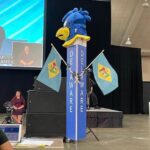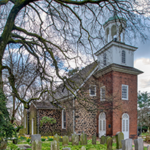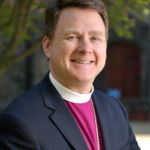General Convention:
and its role in the life of The Episcopal Church
by Melodie Woerman
The Episcopal Church’s General Convention will meet for the 81st time June 23 – 28 in Louisville, Kentucky, at the Kentucky International Convention Center. If you’re asking, “So, what is this exactly, and what does it have to do with me?”, you’re not alone. General Convention can feel as far removed from people in local churches as Congress does from everyday life. But the role it plays impacts a lot of what Episcopalians see and do in their local churches.
Let’s look at three questions:
- What is General Convention?
- What does it do?
- Why does it matter?
What is General Convention?
General Convention is the highest authority in The Episcopal Church. Normally it meets every three years, but because of the COVID-19 pandemic, the meeting that was to have taken place in 2021 was moved to 2022 and was shortened to four legislative days. In 2024, it will meet for six legislative days, although other activities take place before the convention officially gets underway.
It’s been around for a long time, dating back to the period when The Episcopal Church was getting formed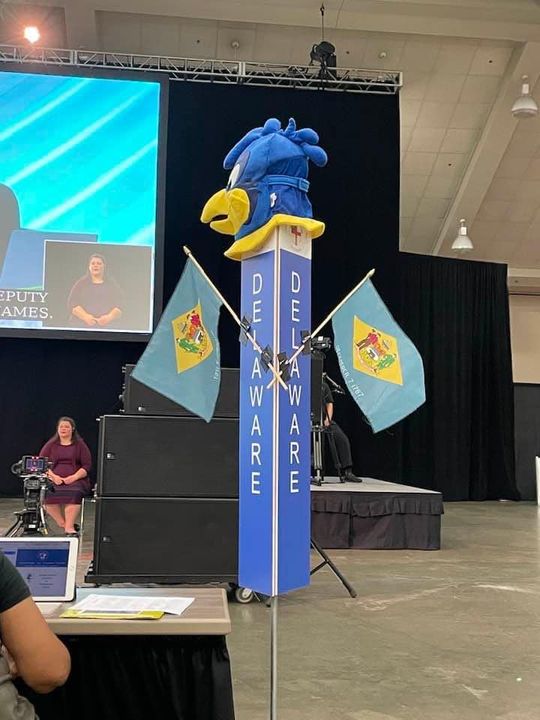 just two years after the end of the American War of Independence. In 1785, laymen and clergy from six states (Delaware, New York, New Jersey, Pennsylvania, South Carolina, and Virginia) gathered as the first General Convention to start forming an Anglican church for the new United States, naming it the Protestant Episcopal Church in the United States of America. The new U.S. church had only one bishop, Samuel Seabury, so they couldn’t form a House of Bishops until two other bishops were consecrated in 1787. In that year, General Convention adopted the structure of the church that we have today, and they approved the first Book of Common Prayer for the entire church.
just two years after the end of the American War of Independence. In 1785, laymen and clergy from six states (Delaware, New York, New Jersey, Pennsylvania, South Carolina, and Virginia) gathered as the first General Convention to start forming an Anglican church for the new United States, naming it the Protestant Episcopal Church in the United States of America. The new U.S. church had only one bishop, Samuel Seabury, so they couldn’t form a House of Bishops until two other bishops were consecrated in 1787. In that year, General Convention adopted the structure of the church that we have today, and they approved the first Book of Common Prayer for the entire church.
It has two houses, like Congress – the House of Deputies and the House of Bishops – and members of both houses are elected by their diocesan conventions. Not every denomination elects the people who serve at the highest legislative level, but The Episcopal Church does. Each house meets separately and has its own officers, and legislation must pass both houses with the same language for it to take effect.
It’s big. The House of Deputies includes four lay people and four clergy from each of the 108 dioceses. So, its membership exceeds 900 people with alternates – and yes, it takes a really big room to accommodate everyone! It also will include 18 young people who make up the Official Youth Presence. They have seat and voice, but they cannot vote. Nevertheless, they play an important role in sharing ideas with deputies.
The House of Bishops is made up of all active and retired bishops, although many retired bishops don’t attend – those who regularly participate currently are about 200 bishops.
But General Convention is more than just legislation. It also includes official worship services, a large exhibit hall where groups around the church can show people who they are and offer items for sale, and a special day camp for children. Other groups around the church – like organizations and seminaries – have their own events, and it often feels like a big reunion.
A revival is scheduled to take place the night before the convention officially begins at the KFC YUM! Center, usually the site of concerts, ice shows and athletic events, including games of the men’s and women’s basketball teams of the University of Louisville.
In addition, the Episcopal Church Women hold their Triennial meeting concurrently with General Convention, and this year will mark the organization’s 150th anniversary as a ministry within The Episcopal Church.
What does General Convention do?
Its purpose is to pass legislation that affects the church – everything from stating the church’s position on things like immigration and the death penalty, to changing canons on clergy conduct and what Bible translations are authorized for use in public worship. Proposed legislation, called resolutions, can come from bishops, deputies, diocesan conventions or from the task forces and commissions that meet between conventions.
All resolutions are referred to one of the convention legislative committees. Deputies and bishops have their own committees on various topics but meet together. Again this year, legislative committees have been meeting online before the start of General Convention to consider proposed resolutions. Committees are required to conduct an open hearing on every resolution assigned to them. People can sign up to speak on those topics, and the public is welcome to be present.
After being considered by a committee, every resolution then starts in one of the two houses where it is voted on, either individually or, in the case of resolutions that appear to be non-controversial, grouped into a consent calendar. If a resolution passes both houses with the same language, it then takes effect.
Why does it matter?
Some crucial elements of the life of The Episcopal Church and Episcopalians come from actions of General Convention. This year there is a major one – the election of a new presiding bishop. Presiding Bishop Michael Curry concludes his nine-year term this year, and his successor will be chosen from among the list of nominees. The House of Bishops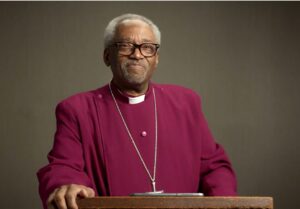 will meet at Christ Church Cathedral on June 26 at 11 a.m. to elect the next presiding bishop, and then it is up to the House of Deputies to confirm (or decline) that election.
will meet at Christ Church Cathedral on June 26 at 11 a.m. to elect the next presiding bishop, and then it is up to the House of Deputies to confirm (or decline) that election.
The House of Deputies also will elect its president, to serve for the next three years.
But General Convention is responsible for many other actions that affect all Episcopalians. Here are some major ones:
- Deciding the text of the Book of Common Prayer, as well as supplemental liturgical materials, like the Book of Occasional Services. It also decides what goes into The Hymnal, as well as what other musical resources are authorized.
- Setting the calendar of saints, currently called Lesser Feasts and Fasts. This year, bishops and deputies will vote on adding feast days for Harriet Tubman and the Consecration of Barbara Harris, among others.
- Creating the process for being ordained a deacon, priest, or bishop. In 1976 General Convention recognized that women could be ordained, and the first openly gay bishop was welcomed in 2003.
- Providing parameters for marriage in the church, which now require all dioceses to make provision for marriage of same-sex couples.
- Deciding the process for identifying and dealing with clergy misconduct and protecting all church members through required Safe Church training.
- Defining the physical boundaries of every diocese and setting up mechanisms for a diocese to split or merge with another. It also decides what dioceses are part of The Episcopal Church. This year it will vote on the juncture of the Dioceses of Eastern Michigan and Western Michigan into the Diocese of the Great Lakes, as well as the reunion of the three dioceses in Wisconsin (Milwaukee, Fond du Lac and Eau Claire) into one Diocese of Wisconsin.
- Declaring when The Episcopal Church is in full communion with another Christian body. The Episcopal Church currently is in full communion with seven other churches, and this year, a resolution proposes establishing full communion with the Evangelical Lutheran Church in Bavaria.
Want to be part of this year’s General Convention?
If you want to follow along closely, sessions of General Convention will be livestreamed, with links available closer to its start in late June.
In addition, anyone can serve as one of the many volunteers that help General Convention run smoothly. Volunteers may serve for as little as a half a day or for multiple shifts over many days.

Melodie Woerman is a freelance reporter for the Episcopal News Service and the former director communications for the Episcopal Diocese of Kansas. She has worked in church communications for 30 years at the diocesan and church-wide level. She has won multiple writing awards and is a fervent champion for communicators and their work. She has one adult son and two large cats, Harry and Hermione. In her spare time she likes to read biographies and works about history, do cross-stitch and crochet, and having watched HGTV for years would be happy to give advice about home renovations.


